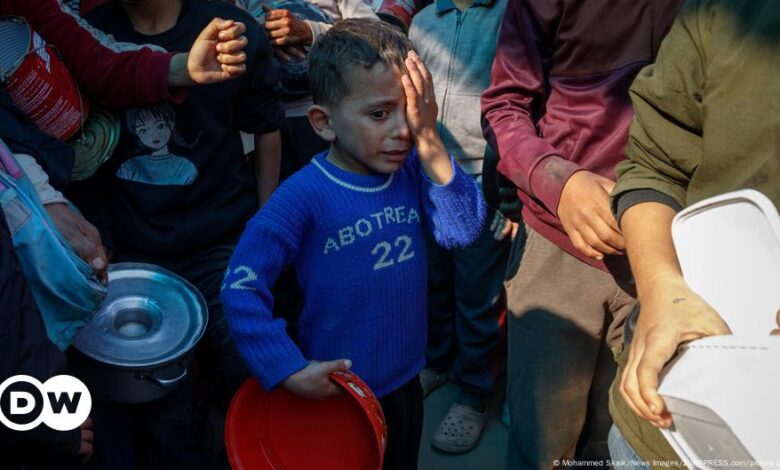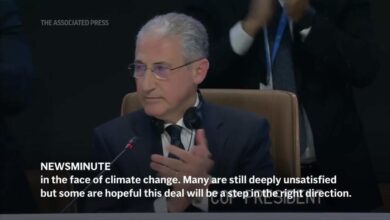Violence against children worldwide at an ‘all-time high’ – DW – 12/08/2024

The latest report from the United Nations Children’s Fund (UNICEF) is damning: one in six children is growing up in a war or conflict zone and are in acute mortal danger due to shelling, hunger and disease, and “levels of violence against children worldwide are at an all-time high.”
In 2023, the United Nations verified a record 32,990 grave violations against 22,557 children in 26 conflict zones — and that is just the tip of the iceberg.
What rights protect children in times of war?
The UN Convention on the Rights of the Child (UNCRC) outlines the fundamental rights of every child, regardless of their race, religion or abilities. The international human rights treaty was adopted in 1989.
The convention states that every child has the right “to play,” as well as “to health and health services,” to be protected from all “forms of physical or mental violence, injury or abuse, neglect or negligent treatment, maltreatment or exploitation” and to be ensured “protection and care” when “affected by an armed conflict.”
Since 1989, three additional protocols have been developed, one of which deals specifically with “the involvement of children in armed conflict.”
Frank Mischo, a children’s right expert at the German NGO Kindernothilfe (Children’s emergency aid), which operates in 33 countries, said that there was a “clear focus on child soldiers.”
He said that “any use of children by armies and armed groups is considered child labor and a serious violation of children’s rights. In the case of children under 15 it is considered a war crime.”
Of all international human rights agreements, it is the Convention on the Rights of the Child that has most signatories, although not all of these have ratified the treaty. Mischo said that it was “grave” that the US and Somalia for instance had not done so.
There are also other instruments and mechanisms that serve to protect children, such as the “Safe Schools Declaration,” which describes itself as “an inter-governmental political commitment to protect students, teachers, schools, and universities from the worst effects of armed conflict” and has been signed by 120 states to date.
The declaration “offers guidance on concrete measures that armed forces and armed non-state actors can take to deter military use of educational facilities, to reduce the risk of attack, and to mitigate the impact of attacks and military use when they do occur.”
Who monitors whether children’s rights are respected?
Mischo explained that data from governments, organizations and individuals was used as the basis for its assessment. “The UN Committee on the Rights of the Child, which is based in Geneva, effectively constantly monitors every country in the world to see how the Convention on the Rights of the Child is being implemented,” he said.
The New York-based UN Special Representative of the Secretary-General for Children and Armed Conflict, currently Virginia Gamba, also plays an important role. They are responsible for documenting particularly serious violations of children’s rights in times of war.
The UN has identified six of these: “Killing and maiming of children; recruitment or use of children in armed forces and armed groups; attacks on schools or hospitals; rape or other grave sexual violence; abduction of children; and denial of humanitarian access for children.”
If combatants are found responsible for any of these violations, they are put on a list and efforts are made for them to enter dialogue “on the development of concrete and time-bound Action Plans to halt and prevent violations.”
Those that breach the rights of children can also be brought before the International Criminal Court (ICC) in the Hague.
In 2023, the ICC issued an arrest warrant for Russian President Vladimir Putin, saying that there were reasonable grounds to believe that he was responsible “for the war crime of unlawful deportation of population and that of unlawful transfer of population from occupied areas of Ukraine to the Russian Federation, in prejudice of Ukrainian children.”
Russia is suspected of transferring thousands of children from children’s homes and other state institutions in Ukraine to Russia and Russian-occupied territories of Ukraine.
Unsafe living conditions can lead to sexualized violence and child labor
Mischo said that in armed conflicts and wars, on top of the risk of being killed or injured, children were often not even guaranteed the basics, “such as enough food and a roof over their heads.” He added that they were often separated from their families and forced to flee.
“These unsafe living conditions lead to a dramatic increase in forced prostitution, sexualized violence and child labor,” he continued. “Children are completely exposed in such situations, that even adults can barely deal with.”
In its report, UNICEF says that despite the fact that most states have ratified the Convention on the Rights of the Child, warring parties frequently flout “one of the most basic rules of war: the protection of children.”
Furthermore, Mischo pointed out that the almost 33,000 serious violations of children’s rights documented in 2023 comprised only those “that have actually been confirmed several times by independent sources, i.e. by the government, UN organizations, third parties. The number of unreported cases is always a hundred times higher.”
According to the UN, the situation was particularly difficult for children in the Occupied Palestinian Territoryof Gaza, Ukraine and Sudan in 2023. “A quarter of all of these children’s rights violations occurred in Gaza,” said Mischo. “Many say it is currently the deadliest place for children in the world. The attacks on schools and hospitals are so systematic that they can no longer be explained in military terms.”
In November, the ICC also issued an arrest warrant against Israeli Prime Minister Benjamin Netanyahu for alleged war crimes and crimes against humanity “as part of a widespread and systematic attack against the civilian population of Gaza.”
Mischo said that such legal proceedings were most effective in halting grave violations of children’s rights in times of war: “The most important thing in my view is the end of impunity, as this acts as a deterrent.”
This article was originally written in German.




